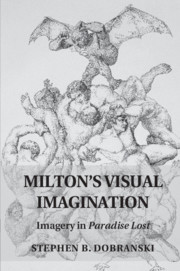Description
Milton's Visual Imagination
Imagery in Paradise Lost
Author: Dobranski Stephen B.
Milton's Visual Imagination contends that Milton enriches his biblical source text with acute and sometimes astonishing visual details.
Language: English40.64 €
In Print (Delivery period: 14 days).
Add to cart
Milton's Visual Imagination
Publication date: 07-2021
Support: Print on demand
Publication date: 07-2021
Support: Print on demand
115.29 €
In Print (Delivery period: 14 days).
Add to cart
Milton's Visual Imagination
Publication date: 10-2015
Support: Print on demand
Publication date: 10-2015
Support: Print on demand
Description
/li>Contents
/li>Biography
/li>
Critics have traditionally found fault with the descriptions and images in John Milton's poetry and thought of him as an author who wrote for the ear more than the eye. In Milton's Visual Imagination, Stephen B. Dobranski proposes that, on the contrary, Milton enriches his biblical source text with acute and sometimes astonishing visual details. He contends that Milton's imagery - traditionally disparaged by critics - advances the epic's narrative while expressing the author's heterodox beliefs. In particular, Milton exploits the meaning of objects and gestures to overcome the inherent difficulty of his subject and to accommodate seventeenth-century readers. Bringing together Milton's material philosophy with an analysis of both his poetic tradition and cultural circumstances, this book is a major contribution to our understanding of early modern visual culture as well as of Milton's epic.
1. Introduction: of things invisible; 2. Free will and God's scales; 3. Heaven's gates; 4. Pondering Satan's shield; 5. What do bad angels look like?; 6. Transported touch; 7. Clustering and curling locks; 8. Images of the future and the son.
Stephen B. Dobranski is Distinguished University Professor of Early Modern Literature and Textual Studies at Georgia State University. He is the author of Milton, Authorship, and the Book Trade (Cambridge, 1999) and Readers and Authorship in Early Modern England (Cambridge, 2005), which received the English Studies Award from the South Atlantic Modern Language Association. He also edited Milton in Context (Cambridge, 2010) and co-edited, with John Rumrich, Milton and Heresy (Cambridge, 1998), both of which received the Irene Samuel Memorial Award from the Milton Society of America.
© 2024 LAVOISIER S.A.S.





